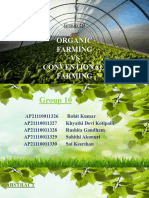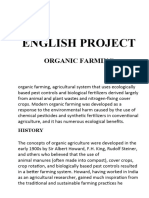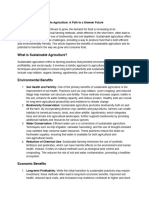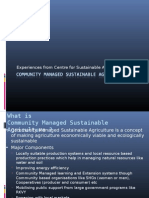Twelve Reasons
Twelve Reasons
Uploaded by
AnnaMaria5595Copyright:
Available Formats
Twelve Reasons
Twelve Reasons
Uploaded by
AnnaMaria5595Copyright
Available Formats
Share this document
Did you find this document useful?
Is this content inappropriate?
Copyright:
Available Formats
Twelve Reasons
Twelve Reasons
Uploaded by
AnnaMaria5595Copyright:
Available Formats
TWELVE
Freshness. Locally grown organic fruits and vegetables are usually harvested within 24 hours of being purchased by the consumer. Produce from California can't be that fresh.
to Buy Local and Organic
Soil Stewardship. Soil health is essential for the survival of our species. Conventional farming practices are rapidly depleting topsoil fertility. Creating and sustaining soil fertility is the major objective of organic growers.
REASONS
Taste. Produce picked and eaten at the height of freshness tastes better.
Energy Conservation. One fifth of all petroleum now used in the United States is used in agriculture. Buying locally grown organic foods decreases dependence on petroleum, a nonrenewable energy source, because organic production systems do not rely upon petroleum derived fertilizers and pesticides. Buying from local producers prevents long distance shipping, so energy is also conserved at the distribution level.
Nutrition. Nutritional value declines, often dramatically, as time passes after harvest. Because locally grown produce is freshest, it is more nutritionally complete.
Environmental Protection. Soil erosion; pesticide contamination of our soil, air, and water; nitrate loading of our waterways and wells, and the elimination of biodiversity are some of the problems associated with today's predominant farming methods. Organic growers use practices that protect soil, air, and water resources as well as promote biodiversity.
Health and Safety. About 80 percent of American adults say they are concerned about the safety of the food they eat. Pesticides and Genetically Modified Organisms (GMOs) are not permitted in an organic production system. Choosing organic food is a way to minimize you and your familys exposure to harmful pesticide residues, which have been linked to cancer and other medical problems.
Cost. Conventional food prices don't reflect the hidden costs of the environmental, health, and social consequences of industrial production practices, such as correcting a water supply polluted by agricultural runoff, or obtaining medical treatment for pesticide induced illness. When these and other hidden costs are taken into account, as they should be, organic foods are seen clearly for the value they are, even if they cost a bit more. Community. Eating locally allows consumers to get to know who raises their food and find out how it was produced, fostering a connection between farmers and the community. Regional food production systems also enable people to influence how their food is grown and provide interesting job and self-employment opportunities.
Regional Economic Health. Buying locally grown food allows you to support your neighbor, keeps money in your community, and helps protect farmland by making farming more profitable, improving everyones quality of life.
Variety. Organic farmers selling locally are not limited to the few varieties of produce that are bred for long distance shipping, high yields, and shelf life. Instead, they raise and sell wonderful, unusual varieties you will never find on supermarket shelves.
Passing on the Stewardship Ethic. When you buy locally produced organic food, you cannot help but raise the consciousness of your friends and family about how food buying decisions can make a difference in your life and the life of your community.
Ohio Ecological Food and Farm Association
41 Croswell Rd., Columbus, Ohio 43214 (614) 421-2022 www.oeffa.org www.oeffa.org/facebook www.twitter.com/oeffa
You might also like
- Organic Farming PPT CLASS 12Document14 pagesOrganic Farming PPT CLASS 12Rajeev Rai91% (11)
- Answer Key Organic Foods Web QuestDocument7 pagesAnswer Key Organic Foods Web QuestMarley DantonNo ratings yet
- Reading and Listening Extra With KeyDocument23 pagesReading and Listening Extra With KeyAncontra100% (2)
- Unit 8 - Listening Test - 98.67Document21 pagesUnit 8 - Listening Test - 98.67Yenni Paola LOPEZ GUERRANo ratings yet
- Sweden Imports Rice Pulses Juni2010Document24 pagesSweden Imports Rice Pulses Juni2010swapnilrane03100% (1)
- The Processed Food Phenomenon: 10 Top Reasons To Go OrganicDocument8 pagesThe Processed Food Phenomenon: 10 Top Reasons To Go OrganicRa'aed SadoonNo ratings yet
- Birds Insects: Conventional FarmersDocument9 pagesBirds Insects: Conventional FarmersRaufia ArdiniNo ratings yet
- 12 April GeographyDocument1 page12 April GeographySheikh Ishtiak AhmedNo ratings yet
- The Impact of FoodDocument11 pagesThe Impact of FoodwbmarkNo ratings yet
- Group 10 ENV FinalDocument17 pagesGroup 10 ENV FinalnagasailavanyadiduguNo ratings yet
- Sustainablefoodandbeveragereport14 150518041334 Lva1 App6892Document30 pagesSustainablefoodandbeveragereport14 150518041334 Lva1 App6892Ryan Sinday AcojedoNo ratings yet
- C1 Organic FoodDocument3 pagesC1 Organic FoodLolaNo ratings yet
- Organic Farming PresentationDocument22 pagesOrganic Farming PresentationHammad Yousaf0% (1)
- Organic FarmingDocument20 pagesOrganic Farmingdksmp100% (3)
- Advantages and Disadvantages Organic Farming.Document21 pagesAdvantages and Disadvantages Organic Farming.lynnNo ratings yet
- English Project PRAKHAR KABRADocument8 pagesEnglish Project PRAKHAR KABRAmaverickxxx1029No ratings yet
- What Is Sustainable AgricultureDocument67 pagesWhat Is Sustainable AgricultureAfitania AnggrainiNo ratings yet
- Cultivating ChangeDocument2 pagesCultivating Changelameck noah zuluNo ratings yet
- Advantages and Disadvantages of Organic FarmingDocument25 pagesAdvantages and Disadvantages of Organic Farmingshankar_shrivastav018No ratings yet
- Sustainable Agriculture: Tiffany RobinsonDocument12 pagesSustainable Agriculture: Tiffany RobinsonSofi MehrajNo ratings yet
- Eating Local - International TradeDocument14 pagesEating Local - International TradeasmaaaaltoumNo ratings yet
- Technology in AgricultureDocument9 pagesTechnology in AgricultureMuhammad ArradhiNo ratings yet
- Sustainable Agriculture - Mathods and ImpactsDocument2 pagesSustainable Agriculture - Mathods and Impactssaphirasufyan2009No ratings yet
- GP Capital Group BroshiurDocument14 pagesGP Capital Group BroshiurShakhawat Hossain AsifNo ratings yet
- Module - 3Document8 pagesModule - 3Harsha HegdeNo ratings yet
- Technological Development of Agriculture and Its Great DilemmasDocument3 pagesTechnological Development of Agriculture and Its Great DilemmasAngelica Mae CornejoNo ratings yet
- Chapter 9 - Sustainable F&B ManagementDocument31 pagesChapter 9 - Sustainable F&B ManagementGianina Nonieca AquinoNo ratings yet
- National Standards of Organic FarmingDocument8 pagesNational Standards of Organic FarmingAmrit SharmaNo ratings yet
- Growing Your Own Food (Marrao, Salaphaty Rao (Marraoso) )Document7 pagesGrowing Your Own Food (Marrao, Salaphaty Rao (Marraoso) )RaoNo ratings yet
- Organic Vegetables: Presented By: Sandeep KumarDocument9 pagesOrganic Vegetables: Presented By: Sandeep KumarAroon BudhaniNo ratings yet
- Organic Farming: Suphalam (Healthy Crop) ? and Where Is That Malayaja Shitalam (Document10 pagesOrganic Farming: Suphalam (Healthy Crop) ? and Where Is That Malayaja Shitalam (Pushkin SaxenaNo ratings yet
- Q&A-about Organic FarmingDocument4 pagesQ&A-about Organic FarmingHarsha HegdeNo ratings yet
- Organic FarmingDocument33 pagesOrganic FarmingAa100% (2)
- 4 Readings - Food IssuesDocument2 pages4 Readings - Food IssuesInmaculada Rodriguez-CórdobaNo ratings yet
- Daran Agriculture ProjectDocument79 pagesDaran Agriculture Projectdaraneeshkumar1234No ratings yet
- Organic FarmingDocument28 pagesOrganic Farmingjulietanitta52No ratings yet
- Organic FarmingDocument9 pagesOrganic FarmingSheryl joy SuplitoNo ratings yet
- Natura VedaDocument1 pageNatura Vedasoundhar0404No ratings yet
- Debate On Veganism (Against)Document4 pagesDebate On Veganism (Against)anwesha putatundaNo ratings yet
- UnknownDocument2 pagesUnknownMuthu LakshmananNo ratings yet
- Newsletter #2 AMOFS May 2014Document2 pagesNewsletter #2 AMOFS May 2014AlMarejOrganicFoodNo ratings yet
- Unlocking Nature's Secrets : A Guide to Biodiversity-Based Organic FarmingFrom EverandUnlocking Nature's Secrets : A Guide to Biodiversity-Based Organic FarmingNo ratings yet
- Organic Farming PDFDocument27 pagesOrganic Farming PDFxianpratzNo ratings yet
- ORGANIC FarmingDocument16 pagesORGANIC FarmingSREYANo ratings yet
- The Organic Manifesto : Growing Food for a Healthier FutureFrom EverandThe Organic Manifesto : Growing Food for a Healthier FutureNo ratings yet
- Organic Farming BoardsDocument25 pagesOrganic Farming BoardsStarNo ratings yet
- HFA4UO - Panel Dicussion - Organic FarmingDocument10 pagesHFA4UO - Panel Dicussion - Organic FarmingShahed NeerNo ratings yet
- Sustainable AgricultureGreenDocument12 pagesSustainable AgricultureGreenrathordipesh84No ratings yet
- Introduction To Organic FarmingDocument27 pagesIntroduction To Organic FarmingxianpratzNo ratings yet
- Project Organic FarmingDocument31 pagesProject Organic FarmingBhushan ParalkarNo ratings yet
- Organic Hydroponic ArticleDocument10 pagesOrganic Hydroponic ArticleMatthew AiyashNo ratings yet
- Ruelatacalowerpointweek14 WPS OfficeDocument13 pagesRuelatacalowerpointweek14 WPS OfficeR ANo ratings yet
- IntroductionDocument2 pagesIntroductionPrince DaddyNo ratings yet
- Benefits of HydroponicsDocument1 pageBenefits of HydroponicsDIGITAL MAXNo ratings yet
- Entrepreneurial Project.Document10 pagesEntrepreneurial Project.fatima shoukatNo ratings yet
- Study Guide 2 s16 2Document43 pagesStudy Guide 2 s16 2api-449956571No ratings yet
- Philippine Organic AgricultureDocument25 pagesPhilippine Organic Agricultureianmaranon100% (1)
- About Organic FarmingDocument3 pagesAbout Organic FarminghemantsajwanNo ratings yet
- Group AssignmentDocument50 pagesGroup Assignmentdelcia douglasNo ratings yet
- đề 2Document8 pagesđề 2Thư NguyễnNo ratings yet
- NSS ReportDocument15 pagesNSS Reportadarshnayak.2023No ratings yet
- Community Managed Sustainable AgricultureDocument38 pagesCommunity Managed Sustainable Agricultureramoo.csaNo ratings yet
- Chapter 10Document34 pagesChapter 10CA Anand MishraNo ratings yet
- Marketing Project of Indian Food MarketDocument67 pagesMarketing Project of Indian Food Marketrgfefh6No ratings yet
- Euromonitor 10 Global Consumer TrendsDocument94 pagesEuromonitor 10 Global Consumer Trendsrave-n100% (2)
- Producer Company Case Study of I of PCL KeralaDocument18 pagesProducer Company Case Study of I of PCL Keralavintosh_pNo ratings yet
- Findings of The StudyDocument4 pagesFindings of The StudyYuvnesh KumarNo ratings yet
- Encyclopedia of Mind Enhancing Foods, Drugs and Nutritional Substances (2nd Edition)Document409 pagesEncyclopedia of Mind Enhancing Foods, Drugs and Nutritional Substances (2nd Edition)Calvin Chiu100% (2)
- 17 Bài Đọc Tủ Reading IeltsDocument87 pages17 Bài Đọc Tủ Reading IeltsNgọc Thiện Kênh Giải Trí Tổng HợpNo ratings yet
- 11102 普一期末英文Document4 pages11102 普一期末英文aa123456787942No ratings yet
- SMILE Reading and Writing Q1 LP5Document7 pagesSMILE Reading and Writing Q1 LP5Angelica PoblacionNo ratings yet
- Chapter 10 - Part 1Document26 pagesChapter 10 - Part 1Peo PaoNo ratings yet
- Unit 02: Safety First: Advertising, Consumers and SafetyDocument19 pagesUnit 02: Safety First: Advertising, Consumers and Safetysara wilsonNo ratings yet
- Fssai PDFDocument88 pagesFssai PDFSiya SinghNo ratings yet
- Latvia AgricultureDocument9 pagesLatvia AgricultureManttie VentisNo ratings yet
- 2011 2012 Beijing Kids Home Relocation GuideDocument53 pages2011 2012 Beijing Kids Home Relocation GuideAndreas KönigNo ratings yet
- Mother Earth News - June-July 2014 PDFDocument116 pagesMother Earth News - June-July 2014 PDFKridsadaTKs100% (8)
- Chapter OneDocument19 pagesChapter OnePrashant Raj NeupaneNo ratings yet
- 30 Day Clean Eating PDFDocument47 pages30 Day Clean Eating PDFIreneo100% (3)
- A Text Book of Modern Organic Farming: Hariom MishraDocument217 pagesA Text Book of Modern Organic Farming: Hariom MishraCyril NitchezNo ratings yet
- Backyard LibertyDocument125 pagesBackyard LibertyDavid RodriguezNo ratings yet
- 1 Heena.G.Gidwani 16 2 Samixa.P.Raval 47Document6 pages1 Heena.G.Gidwani 16 2 Samixa.P.Raval 47Vinita OzaNo ratings yet
- Endterm-OutputDocument19 pagesEndterm-OutputKisha GatocNo ratings yet
- ZBORNIKDocument485 pagesZBORNIKDragan GrčakNo ratings yet
- Production of Organic Vegetable SeedsDocument99 pagesProduction of Organic Vegetable SeedsSchool Vegetable GardeningNo ratings yet

























































































